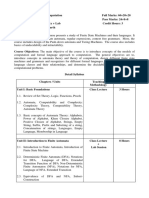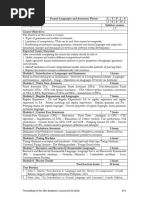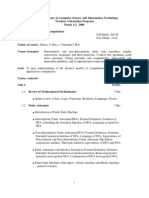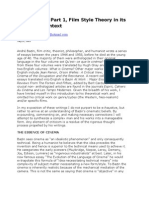Automata Theory: CSCI549-001
Automata Theory: CSCI549-001
Uploaded by
nourinCopyright:
Available Formats
Automata Theory: CSCI549-001
Automata Theory: CSCI549-001
Uploaded by
nourinOriginal Description:
Original Title
Copyright
Available Formats
Share this document
Did you find this document useful?
Is this content inappropriate?
Copyright:
Available Formats
Automata Theory: CSCI549-001
Automata Theory: CSCI549-001
Uploaded by
nourinCopyright:
Available Formats
Texas A&M University - Commerce
Tentative Course Syllabus
CSCI549-001
AUTOMATA THEORY
Spring, 2013
Department of Computer Science
College of Arts and Sciences
Class Meetings: Thursdays 2:00PM-4:40PM (Classroom: HL306)
Instructor:
Dr. S. Suh, Professor & Head, Department of Computer Science
Texas A&M University - Commerce
Office: Jour 123; Phone: 903.468.8199; E-mail: sang.suh@tamuc.edu
Textbook:
Introduction to Computer Theory by Daniel I. A. Cohen
John Wiley & Sons, Inc., 1997, 2nd Ed. ISBN 0-471-13772-3
Textbook Organization:
PART I: Chapters 1,2,3,4,5,6,7,8,9,10 and 11
PART II: Chapters 12,13,14,15,16 and 17
PART III: Chapters 19 and 20
Course Objectives:
This course is one of the five core courses for M.S. degree in Computer Science at Texas A&M
University - Commerce. The primary goal of this course is to provide fundamental introduction to
the design of programming languages (PL). Both the theoretical foundations of PL and its
practical aspect will be studied by covering chapters 1 through 20. The fundamental topics to be
covered in this course include regular expressions, finite automata, (non-)regular languages,
context-free grammars, regular grammars, Chomsky normal forms, pushdown automata, (non-
)context-free languages, parsing and Turing machines. These fundamentals are essential
prerequisite for those who may pursue more advanced topics and applications of Computer
Science. Since the ultimate goal of automata theory is the construction of efficient program
languages, no study of automata is complete without some experience designing grammars. For
this purpose, a medium-scale program language design project will be assigned as a class
project. The design project is an essential part of the successful course completion. The grading
will be based on the following criteria:
STUDENT LEARNING OUTCOMES (SLO):
1. Understand the concept of formal languages through such mechanism as regular expression,
recursive definitions, finite automata, transition graph, Mealy machine and Moore machine.
2. Apply Kleene’s theorem and pumping lemma for the design and management of regular and
non-regular languages.
3. Construct context free, regular, Chomsky normal form grammars to design computer
languages
4. Design and construct a pushdown automata and a Turing machine for a computer language
5. Design and implement the LR(1) parser for a computer language
Students with Disabilities Act Compliance:
Students requesting accommodations for disabilities must go through the Academic
Support Committee. For more information, please contact the Director of Disability
Resources & Services, Halladay Student Services Bldg., Room 303D, (903) 886-5835
Academic Ethics:
"All students enrolled at the University shall follow the tenets of common decency and
acceptable behavior conducive to a positive learning environment." (See Student's Guide
Handbook, Policies and Procedures, Conduct).
Attendance Policy:
Students are expected to be present at all class lectures. If a student is absent from class
on the due date of any assignment, they are expected to make alternative arrangements to
assure that the assignment is turned in ON TIME. Any student wishing to withdraw from the
course must do so officially as outlined in the class schedule. THE INSTRUCTOR
CANNOT DROP OR WITHDRAW ANY STUDENT.
Course Requirement Deadlines:
Credit will be given for ONLY those exam(s), program(s), and/or project(s) turned in no later
than the deadline(s) as announced by the instructor of this class unless prior arrangement
has been made with the instructor.
Method of Evaluation (Tentative):
Two/Three Tests (70%, in class - closed book – 25/45 or 15/15/40)
Quizzes and Participation (10%)
Implementation Project (20%)
Course Outline:
WEEKS SUBJECTS TO BE COVERED
1 Chapters 1 (Introduction to Automata Theory)
-Automata Theory
2 Chapters 2 & 3 (Languages and Recursive Definitions)
-Languages
-Kleene Closure
-Terminology
-Recursive Definition
-Arithmetic Expression
3 Chapters 4 (Regular Expressions)
-Regular Expressions
-Regular Languages
-EVEN-EVEN
4 Chapter 5 (Finite Automata)
-Definitions of Finite Automata
-Examples of Finite Automata
-EVEN-EVEN revisited
5 Chapter 6 & 8 (TG and FA with Output)
-Transition Graph (Definition)
-Transition Graph vs. Finite Automata
-Moore Machine and Mealy Machine
-Moore Machine = Mealy Machine
6 Chapter 7 (Kleene’s Theorem)
-Kleen’s Theorem
-TG to Regular Expression
-Regular Expression to FA
-Nondeterministic FA
-NFA and Kleene’s Theorem
7 Chapter 9 & 10 (Regular and Non-regular Languages)
-Closure Properties (Union, Intersection. Kleene Star)
-Complements and Intersections (Closure Properties)
-Pumping Lemma
-Quotient Languages
Midterm Exam
-Chapters 1-10
8 Chapter 12 (Context Free Grammars)
-Grammars, Context Free Grammars
-Ambiguity
-Total Language Trees
-Syntax Trees, Generation Trees, Parse Trees, Production Trees,
Derivation Trees
9 LR(1) Parser
-Parser Project
10 Chapter 14 (Pushdown Automata)
-Pushdown Automata
-Applications of PDA
11 Chapters 13 & 16 (Non-context Free Languages)
-Chomksy Normal Form
-Regular Grammars
-Pumping Lemma for CFLs
12 Chapter 17 (Context Free Languages)
-Closure Properties
-Intersection and Complement
-Context Free Languages vs. Regular Languages
13 Chapters 19 & 20 (Turing and Post Machines)
-Turing Machine
14 Final Exam and Project Demos
15 Reserved for Project Demos and Makeups
LITERATURE SEARCH AND RESEARCH ASSISTANCE:
For research assistance, please contact:
John Atabaev, Reference Librarian: Sciences & Collection Development
John.Atabaev@tamuc.edu
903-886-5726
STUDENTS REQUIRING ASSISTANCE: Requests from students with disabilities
for reasonable accommodations Office of Disability Resources, Halladay
Student Services Building, Room 303D, 903-886-5835.
You might also like
- Westby Play Scale (2000)Document5 pagesWestby Play Scale (2000)ads90% (10)
- Theory of Computation and Application- Automata,Formal languages,Computational Complexity (2nd Edition): 2, #1From EverandTheory of Computation and Application- Automata,Formal languages,Computational Complexity (2nd Edition): 2, #1No ratings yet
- JurisprudenceDocument16 pagesJurisprudenceSandeep Chawda100% (1)
- J L Styan - Elements of Drama (1963, Cambridge University Press) PDFDocument328 pagesJ L Styan - Elements of Drama (1963, Cambridge University Press) PDFAndrew100% (2)
- Unit 1 Test 1 ADocument2 pagesUnit 1 Test 1 AAna GalacNo ratings yet
- Oultine CS 729 TheoryOfAutomataAndFormalLanguages Spring 2012 (MCS 2 Morning)Document5 pagesOultine CS 729 TheoryOfAutomataAndFormalLanguages Spring 2012 (MCS 2 Morning)Umar TahirNo ratings yet
- ITE1006 Theory-Of-Computation TH 1 AC40Document2 pagesITE1006 Theory-Of-Computation TH 1 AC40Rahul JainNo ratings yet
- Theory of Computer ScienceDocument3 pagesTheory of Computer Sciencejoshi_sachinNo ratings yet
- CS301 Theory of Computation Syllabus CSE-Semesters - 5Document4 pagesCS301 Theory of Computation Syllabus CSE-Semesters - 5lijaNo ratings yet
- CSC-302_TheoryAutomata_CourseOutline (1)Document6 pagesCSC-302_TheoryAutomata_CourseOutline (1)usama.sabirNo ratings yet
- Course Outline - TOA-4B-Fall-2021Document6 pagesCourse Outline - TOA-4B-Fall-2021usamaNo ratings yet
- 15CS54Document2 pages15CS54Pavan KumarNo ratings yet
- Toc SyllabusDocument2 pagesToc SyllabusSanjana NNo ratings yet
- Discrete Structures, Logic and Computability by James L. HeinDocument2 pagesDiscrete Structures, Logic and Computability by James L. HeinTrinh Ngô Lê PhươngNo ratings yet
- Theory of ComputationDocument10 pagesTheory of ComputationAnujNo ratings yet
- TOA OutlineDocument2 pagesTOA Outlineioof4fwyNo ratings yet
- IT-361 Theory of Automata OutlineDocument4 pagesIT-361 Theory of Automata OutlineRashid KhanNo ratings yet
- Course Handbook - Formal Language and Automata Theory(1)Document2 pagesCourse Handbook - Formal Language and Automata Theory(1)berihufsaha12No ratings yet
- CE503-N Theory of ComputationDocument3 pagesCE503-N Theory of ComputationKush PrajapatiNo ratings yet
- AutomataDocument11 pagesAutomataराहुल कुमारNo ratings yet
- Theory of ComputationDocument2 pagesTheory of ComputationTanmay RanjanNo ratings yet
- TAFL syllabus-1Document6 pagesTAFL syllabus-1abhinav12378No ratings yet
- Birla Institute of Technology and Science, Pilani Pilani Campus Instruction DivisionDocument3 pagesBirla Institute of Technology and Science, Pilani Pilani Campus Instruction DivisionAyush SharmaNo ratings yet
- Theory of Computation: II B. Tech. - II Semester L T P C Course Code: A3CS10 4 1 - 4Document2 pagesTheory of Computation: II B. Tech. - II Semester L T P C Course Code: A3CS10 4 1 - 4scribd2No ratings yet
- Automata TheoryDocument57 pagesAutomata Theorysir ABDNo ratings yet
- 32877.TOC - CHO 3rd SemDocument9 pages32877.TOC - CHO 3rd SemMansi GargNo ratings yet
- 4th Sem Micro-Syllabus All in 1Document30 pages4th Sem Micro-Syllabus All in 1ArpoxonNo ratings yet
- Syllabus Theory of Computation (CSC257)Document6 pagesSyllabus Theory of Computation (CSC257)File StreamNo ratings yet
- 1 Outline TOA B S2021Document6 pages1 Outline TOA B S2021ali yousafNo ratings yet
- Csi1003 - Formal-Languages-And-Automata-Theory - TH - 1.0 - 57 - Csi1003 - 59 AcpDocument2 pagesCsi1003 - Formal-Languages-And-Automata-Theory - TH - 1.0 - 57 - Csi1003 - 59 AcpSachien NandagopalNo ratings yet
- Bcse304l Theory-Of-computation TH 1.0 70 Bcse304lDocument2 pagesBcse304l Theory-Of-computation TH 1.0 70 Bcse304lb20126381No ratings yet
- Bcse304l Theory-Of-computation TH 1.0 70 Bcse304lDocument2 pagesBcse304l Theory-Of-computation TH 1.0 70 Bcse304lIsam Abdul AzizNo ratings yet
- Bcse304l Theory-Of-Computation TH 1.0 70 Bcse304lDocument2 pagesBcse304l Theory-Of-Computation TH 1.0 70 Bcse304lVenkat BalajiNo ratings yet
- Theory of AutomataDocument4 pagesTheory of AutomataShan Ali5656No ratings yet
- CSE1008 - THEORY-OF-COMPUTATION - TH - 2.0 - 9 - CSE1008 - Theory of Computation - Revision - 2.0 (12 BoS)Document2 pagesCSE1008 - THEORY-OF-COMPUTATION - TH - 2.0 - 9 - CSE1008 - Theory of Computation - Revision - 2.0 (12 BoS)wewfe543No ratings yet
- Outline PDFDocument3 pagesOutline PDFIsrat Noor KaziNo ratings yet
- CS 315-Theory of Automata-Shahab BaqaiDocument3 pagesCS 315-Theory of Automata-Shahab BaqaiZia AzamNo ratings yet
- Course Outline Fall 2023Document4 pagesCourse Outline Fall 2023SA GamingNo ratings yet
- Theory of ComputationDocument6 pagesTheory of ComputationkomalpillaNo ratings yet
- Course Title: Theory of Computation Credit Units: 04 Course Code: CSE204Document3 pagesCourse Title: Theory of Computation Credit Units: 04 Course Code: CSE204Harsh polasNo ratings yet
- SEMESTER V EditedDocument11 pagesSEMESTER V Editedsenthil kumarNo ratings yet
- Formal Languages and Automata Theory: (Common To CSE & IT) Course Code: L T P C 3 0 0 3Document2 pagesFormal Languages and Automata Theory: (Common To CSE & IT) Course Code: L T P C 3 0 0 3Durga Prasad NanginaNo ratings yet
- FormalLang FormalLanguagesTheoryvvvAutomataDocument1 pageFormalLang FormalLanguagesTheoryvvvAutomatashafqatsimailNo ratings yet
- CSE321Document4 pagesCSE321Manoj SharmaNo ratings yet
- 20cs2204 - Formal Languages and Automata TheoryDocument2 pages20cs2204 - Formal Languages and Automata Theorysowmitha devireddyNo ratings yet
- NewSyllabus 143320148604903Document3 pagesNewSyllabus 143320148604903walterblancolovesmethNo ratings yet
- Sem/Year: Iv Sem Course Code: 16Cs205 Title of The Course: Finite Automata and Formal Languages L: T/A:P: C: 3: 2: 0: 4 Course ObjectivesDocument2 pagesSem/Year: Iv Sem Course Code: 16Cs205 Title of The Course: Finite Automata and Formal Languages L: T/A:P: C: 3: 2: 0: 4 Course ObjectivesNarmatha ThiyagarajanNo ratings yet
- Theory of Computation BCSE304LDocument3 pagesTheory of Computation BCSE304LVarshan AvrNo ratings yet
- TOA OUTLINE 2021Document5 pagesTOA OUTLINE 2021HIRA AKRAMNo ratings yet
- Theory of Automata and Formal LanguagesDocument2 pagesTheory of Automata and Formal Languagesanuraggupta85No ratings yet
- Cse2013 - Theory-Of-Computation - TH - 1.0 - 63 - Cse2013 - 59 AcpDocument2 pagesCse2013 - Theory-Of-Computation - TH - 1.0 - 63 - Cse2013 - 59 AcpLokesh ReddyNo ratings yet
- Final Exam Study Guide - AutomataDocument1 pageFinal Exam Study Guide - AutomataDawit BerhanuNo ratings yet
- Gujarat Technological University: W.E.F. AY 2018-19Document3 pagesGujarat Technological University: W.E.F. AY 2018-19diyab6804No ratings yet
- CS301 Theory of ComputationDocument2 pagesCS301 Theory of ComputationroseNo ratings yet
- 511CIT05 Formal Languages and Automata Theory LTPM C 3 1 0 100 4 AimDocument2 pages511CIT05 Formal Languages and Automata Theory LTPM C 3 1 0 100 4 AimTiffany BryanNo ratings yet
- UDocument2 pagesUSankalp GuptaNo ratings yet
- F23 - CSCL - Theory of Automata and Formal Languages - OBE - Outline 2Document9 pagesF23 - CSCL - Theory of Automata and Formal Languages - OBE - Outline 2Ahmad RazaNo ratings yet
- FAFL Notes (2010) (SJBIT) PDFDocument124 pagesFAFL Notes (2010) (SJBIT) PDFSampreeth03No ratings yet
- Syllabus (TOC)Document1 pageSyllabus (TOC)KSHITIJ CHAUDHARYNo ratings yet
- AT SyllabusDocument3 pagesAT Syllabusmaaz.ai.17101710No ratings yet
- Automata Theory TDocument5 pagesAutomata Theory TSanjana Karthik NaiduNo ratings yet
- Semester VDocument22 pagesSemester Vsenthil kumarNo ratings yet
- Optimization for Decision Making: Linear and Quadratic ModelsFrom EverandOptimization for Decision Making: Linear and Quadratic ModelsNo ratings yet
- Utomata Heory: Tudy UideDocument41 pagesUtomata Heory: Tudy UidenourinNo ratings yet
- Cyber WarfareDocument26 pagesCyber WarfarenourinNo ratings yet
- Siba Toa 5Document14 pagesSiba Toa 5nourinNo ratings yet
- Self-Organizing Roles On Agile Software Development TeamsDocument23 pagesSelf-Organizing Roles On Agile Software Development TeamsnourinNo ratings yet
- Latest Topics in Computer Science For Project and Thesis PDFDocument14 pagesLatest Topics in Computer Science For Project and Thesis PDFnourinNo ratings yet
- Testing Department Of: Services Computer Program: MS-Computer and MS-SoftwareDocument1 pageTesting Department Of: Services Computer Program: MS-Computer and MS-SoftwarenourinNo ratings yet
- Tematica Clasa 6Document3 pagesTematica Clasa 6loredanaNo ratings yet
- English, A Cuckoo in The European Nest of LanguagesDocument21 pagesEnglish, A Cuckoo in The European Nest of Languagesschmidt6No ratings yet
- André Bazin-Part 1, Film Style Theory in Its Historical ContextDocument15 pagesAndré Bazin-Part 1, Film Style Theory in Its Historical Contextalpesh972No ratings yet
- Lesson PlanDocument5 pagesLesson PlanjimjimNo ratings yet
- Access Literature: An Introduction To Fiction, Poetry, and DramaDocument3 pagesAccess Literature: An Introduction To Fiction, Poetry, and DramaNova Julianta SiagianNo ratings yet
- Writing Guide IV B2 AdjDocument9 pagesWriting Guide IV B2 Adjjocker78No ratings yet
- Principles of Speech Writing: The Process The ComponentsDocument15 pagesPrinciples of Speech Writing: The Process The ComponentsRDNo ratings yet
- ICoRD15 PrintedPaper WebDocument12 pagesICoRD15 PrintedPaper Webchhandak7pradhanNo ratings yet
- Bahasa Inggris Kelas XDocument10 pagesBahasa Inggris Kelas Xsutra helendNo ratings yet
- Kunci Jawaban Bahasa Inggris Semester Gasal 2021 - 2022Document6 pagesKunci Jawaban Bahasa Inggris Semester Gasal 2021 - 2022AGIK LISDIYONONo ratings yet
- Kannada Kali Q & aDocument31 pagesKannada Kali Q & agomezedric50No ratings yet
- Class 7 Summer Season Holiday HomeworkDocument5 pagesClass 7 Summer Season Holiday Homeworkboyhunny812No ratings yet
- GGGDocument2 pagesGGGChristian Toledo PaglumotanNo ratings yet
- How To Do Morphology ProblemsDocument4 pagesHow To Do Morphology ProblemsPrima Nome100% (1)
- Ujian Selaras 2 Bahasa Inggeris PeralihanDocument6 pagesUjian Selaras 2 Bahasa Inggeris Peralihani_shaNo ratings yet
- SoW IGCSE Greek Final 7Document37 pagesSoW IGCSE Greek Final 7rgp9xwwq6nNo ratings yet
- Functional Programming With ScalaDocument23 pagesFunctional Programming With ScalaBi NguyễnNo ratings yet
- Gerund or Infinitive INGDocument5 pagesGerund or Infinitive INGAndrezecoNo ratings yet
- 剑桥新思维英语青少版 2级 语法与口语练习册答案Document9 pages剑桥新思维英语青少版 2级 语法与口语练习册答案shan wuNo ratings yet
- England (1998) - Promoting Effective Professional Development in ELTDocument9 pagesEngland (1998) - Promoting Effective Professional Development in ELTharrisventuraNo ratings yet
- PA-T1 - IELTS Writing Task 1 StudentDocument4 pagesPA-T1 - IELTS Writing Task 1 StudentHồng NhậtNo ratings yet
- Unit 1 - Lesson 1.1 - Vocabulary & Listening - Page 6Document25 pagesUnit 1 - Lesson 1.1 - Vocabulary & Listening - Page 6Thanh NgàNo ratings yet
- English Grammar - EllipsisDocument2 pagesEnglish Grammar - EllipsisChiby MirikitufuNo ratings yet
- 628968-23 RemoTools SDK enDocument4 pages628968-23 RemoTools SDK enElemac1No ratings yet
- Personality Development Training: Your Image and Its ImpactDocument18 pagesPersonality Development Training: Your Image and Its ImpactVincent Van Assen50% (2)
- NCERT Books Class 7 SanskritDocument1 pageNCERT Books Class 7 Sanskritstudies2todayNo ratings yet































































































